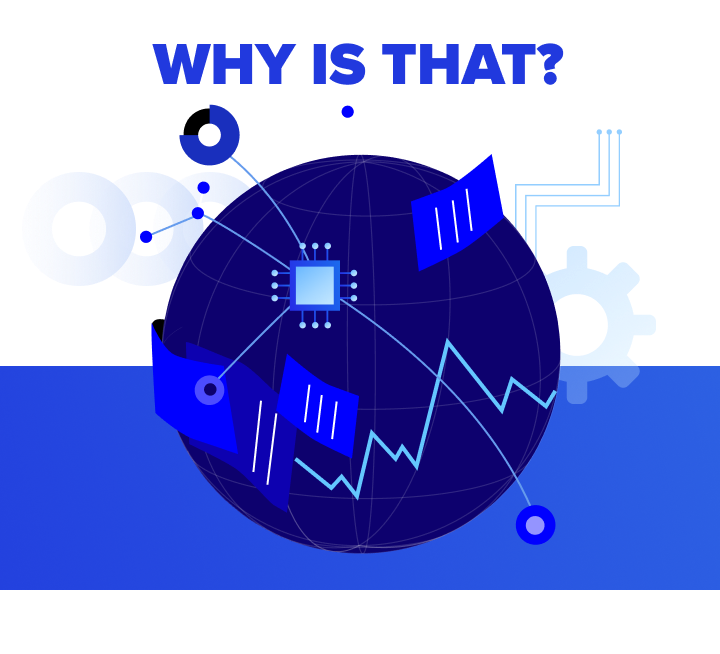
Don't want to miss a thing?
Product Management Must Own AI/ML Technology at Software Companies
Recent AI/ML research from SoftServe shows that software company executives believe investing in artificial intelligence (AI) and machine learning (ML) technology is imperative for growth and competition. AI/ML drives successful product innovation and better business outcomes.
SoftServe’s global study also reports that IT is the primary AI/ML investment influencer. These organizations' principal AI/ML investment drivers are IT experimentation and innovation. Even with the powerful advocacy of IT, 97% of the executives who participated in the survey said that AI/ML initiatives fall short of their expectations.

The answer lies in ownership. IT knows how to put AI/ML to work. But this group doesn't know how to productize the technology. If independent software vendors (ISVs) and digital native businesses (DNBs) want optimal AI/ML returns on investment, IT must step aside and let product management take the lead.
Product management is the true AI/ML champion. It takes a rigorous product development approach to unlock and demonstrate the value of AI/ML.
AI/ML HOW-TO PRODUCT INNOVATION SERIES
Following is the third of a three-part, how-to series of articles that explore the best way to drive product innovation and better business outcomes at ISVs and DNBs.
The first article — ISV and DNB Roadmap to Machine Learning Success — reviews and elaborates on six foundational recommendations that came out of the above-mentioned research.
The second article — AI Practitioner and Visionary’s Perspective: Time to Get Serious About AI/ML Innovation — delves into how software companies can position the use of AI/ML as a top priority from the perspective of AI expert Iurii Milovanov.
In this article, Chuck Ros, Industry Success Leader, High Tech, and Emerging Markets at SoftServe, interviews Anna Strelchuk, Product Management Center of Excellence Leader at SoftServe, about the criticality of AI/ML innovation from a product leader’s POV.
AI/ML INNOVATION AND PRODUCT MANAGEMENT: A Q&A

AS: ML product development is different from traditional coding, and it implies a different focus in product management. Let me break it down for you.
First, ML models rely heavily on data. As a product manager, you need to pay special attention to data quality, understanding its business context and limitations.
Second, ML product development relies even more on iterative development processes. Don’t expect your product to work perfectly from day one. You need to embrace an agile approach, continuously refining and improving the models based on user feedback and performance metrics. That’s why it’s critical to incorporate a customer feedback loop to ensure continuous improvement.
Third, ML models learn and adapt over time. You are responsible for monitoring their performance through close collaboration with your data science team to identify areas for improvement and integrate new data points and features to enhance model accuracy.
Four, ethical considerations have become more important. ML raises questions about bias, fairness, and privacy. You must navigate these issues and ensure your models align with ethical guidelines and legal regulations and cause no harm to people or your company’s reputation.
Lastly, successful ML product development requires focus, transparency, and collaboration. ML models can be complex and hard. It's your job as a product manager to define the business case and how successful model outcomes look from the business standpoint. This requires close collaboration with data scientists and business stakeholders to ensure the team is aligned on who, what, when, where, why, and how.
To sum up, ML product development shifts the team’s focus to data, relies even more on an iterative approach, emphasizes continuous learning, raises ethical considerations, and calls for transparency and close collaboration across teams.


AS: ML product development impacts the product team structure by bringing in roles like data scientists and ML operations experts. It requires even more collaboration between product managers, UX designers, data scientists, and engineers. QA and testing processes for ML features are different.
The need to consider ethics and privacy implies product teams may need ethics and compliance experts to adhere to legal, ethical, as well as company regulatory and data privacy, standards. Product leaders managing ML features should reconsider not only the roles within their product teams but also the processes the teams follow.

AS: Creating and evolving ML-enabled products does bring changes to the traditional agile methodology. While agile principles like iterative development, continuous feedback, and being human-centric remain relevant, there are additional specific considerations for ML.
Developing ML products often involve experimentation, model training, and fine-tuning, which may require longer development cycles compared to traditional software features. This calls for flexibility in planning your product strategy and development.
There are new agile data science methodologies emerging on the market that combine agile principles with ML-specific practices, such as iterative model development, A/B testing, and incorporating feedback loops with data scientists, the business, and users. This approach allows the team to experiment frequently and learn rapidly while maintaining the flexibility to adapt to evolving requirements and data challenges.

AS: I genuinely believe product teams working with ML-enabled products are more empowered compared to teams working with traditional products. Creating and evolving successful ML products forces product teams to be more data-driven, adopt experimentation and iteration, foster collaboration, facilitate a user-centric approach, and drive innovation for competitive advantage.
As a product manager, you need to constantly rely on data-driven decision-making, experimentation, collaboration, and out-of-the-box thinking. ML product features require empowering your product teams.

AS: I think generative AI is likely to transform the way we work and collaborate now. I see enormous potential in leveraging AI to make us more efficient — from automating tedious tasks to facilitating data-driven decisions made through AI-generated insights.
Regarding generative AI and its impact on a software product’s user interfaces, it has the potential to revolutionize software product user interfaces by automatically generating dynamic and personalized interfaces that adapt to individual user preferences. That can be huge! Generative AI can enable truly personalized user experiences.
I’m not sure how far we are from that future. But what we can do now to be better prepared for it is to:
- Closely monitor the latest advancements in generative AI and its applications in product design and development.
- Experiment and test generative AI-driven UIs to assess their benefits, limitations, and usage.
- Better understand ethical considerations associated with generative AI, such as bias, data privacy, and unintentional outputs.
CONCLUSION
Software and digital native companies leading the charge in AI/ML product innovation have shown enough success with the technology to prove the viability and feasibility of productizing AI/ML technology.
But a lack of alignment from strategy to execution, with poor execution of quantitative product management processes, is endangering the reputation of IT, which plays an oversized role in AI/ML innovation and technology.
A critical threshold is quickly approaching. Organizations that successfully cross it with value-delivering AI/ML product features will dominate their markets. Those organizations that hesitate may find it difficult to catch up any time soon.
SoftServe research states that in the next five years, the only competitively viable publishing of business and consumer software will be from those that have AI/ML functionality.
If you would like more information about how SoftServe can help your organization drive product innovation and better business outcomes with AI/ML technology, let’s talk.


